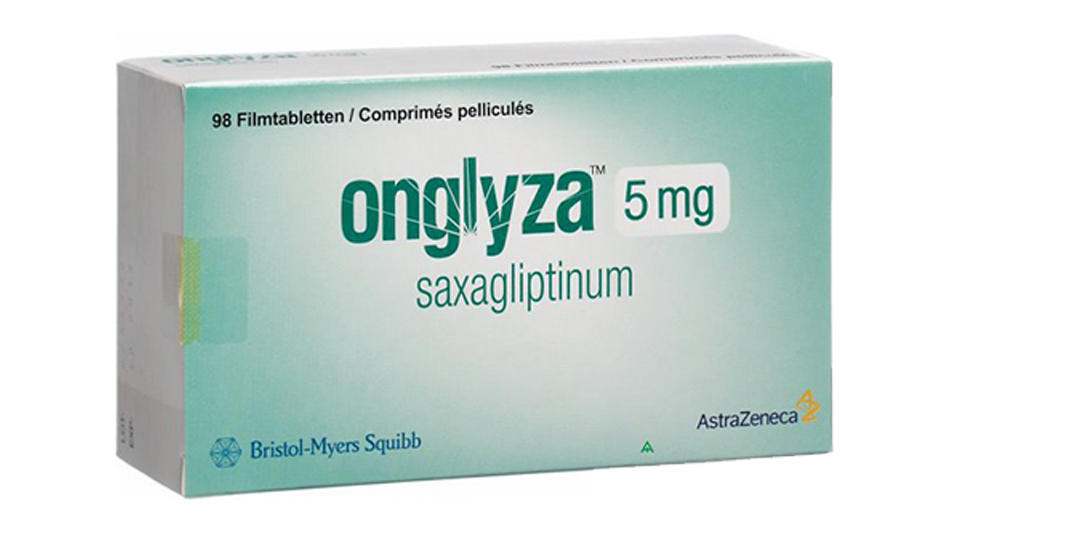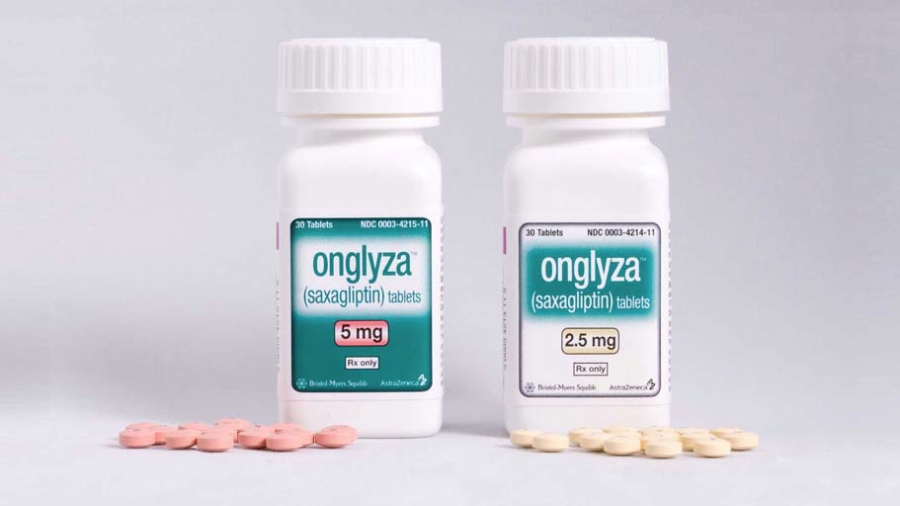Written by Katie Hanna
Onglyza (saxagliptin) is a medication prescribed to treat Type 2 Diabetes- a disease characterized by the bodies inability to regulate its blood-glucose levels with insulin created by the pancreas. Also referred to as Hyperglycemia, or Insulin-Resistance, Type 2 Diabetes is the most common form of Diabetes facing Americans today. The Centers for Disease Control and Prevention (CDC) estimates more than 30 million adults are now diabetic with another 84 million displaying pre-diabetic symptoms.
Onglyza, manufactured by AstraZeneca Pharmaceuticals, was approved by the U.S. Food & Drug Administration (FDA) in 2009. It is in the dipeptidyl peptidase-4 (DPP-4) inhibitor drug class, which work by blocking hormone-destroying enzymes in the gastrointestinal tract. AstraZeneca claims that saxagliptin use can help to reduce the amount of sugar released by the patients liver overnight and also potentially reduce after-meal blood sugar spikes.
AstraZeneca began marketing Onglyza immediately after FDA approval without conducting clinical trials, and against the regulators advisory which urged pharmaceutical companies to “demonstrate that the therapy will not result in an unacceptable increase in cardiovascular risk.” In 2013, a third-party clinical trial, SAVOR-TIMI 53, published in the New England Journal of Medicine, revealed that saxagliptin is linked to an increased risk of heart failure and congestive heart failure.
The study postulates that the “safety and efficacy of many current antihyperglycemic agents, including saxagliptin, a dipeptidyl peptidase 4 (DPP-4) inhibitor, are unclear.” The study followed more than 16,000 patients over the course of 2 years who were being treated for Type 2 Diabetes with medications, including Onglyza. It concluded that saxagliptin use was associated with a 27 percent increase in patient hospitalizations for heart failure.
Oddly, it took an additional three years for the FDA to order AstraZeneca to modify the warning indications for saxagliptin after a safety review agreed that the drug could increase the risk of heart failure, particularly in patients who already have heart or kidney disease. They mandated a new “black box warning” reflecting their findings to be added to the label. The warning came too late.
In 2017, Wendell Chester, one of the first to come forward, claimed to have used both Onglyza and Kombiglyze XR– a metformin and saxagliptin combination drug- between 2010 and 2015 to treat Type 2 Diabetes. He suffered heart failure, congestive heart failure, and acute hypoxic respiratory failure, he says, as a result of using the drugs.
The suit, filed in the U.S. District Court of Southern Texas against Bristol-Myers Squibb Company, AstraZeneca-Pharmaceuticals and McKesson Corporation stated that, “At no time during the development of its saxagliptin drugs did the defendants perform adequate studies to determine if their drug, and its drastic alterations of the natural incretin hormone cycle, may cause increased risks of cardiovascular-related adverse events. Such studies are essential when developing, and then marketing, diabetic drugs to individuals already at an increased cardiovascular risk.”
Later that year, a group of plaintiffs filed a request with the Judicial Panel on Multidistrict Litigation (JPML) to combine all Onglyza lawsuits. The JPML is a group appointed within the federal court system that manages related lawsuits filed in multiple courts. It has the power to determine whether civil actions pending in two or more judicial districts should be consolidated and transferred to a single federal district court for proceedings.
Bristol-Myers Squibb/AstraZeneca responded by arguing against the action, stating in November 2017, that, “there were a limited number of cases and there was no evidence that litigation would continue to grow.” In addition, they also stated that it could complicate resolution because the cases involve a “range of claimed injuries not well suited for consolidation.” They suggested that “informal cooperation” would be sufficient to resolve the cases.
By July 2018, that “limited number” exceeded 200 and the JPML ultimately determined that all the suits, except those in California who have elected to stay localized, would indeed be consolidated to the Eastern District of Kentucky. They based their decision on a standard which states that all the parties involved should demonstrate “common questions of fact.”
These common questions of fact include,
- whether Onglyza can cause heart failure or other conditions such as congestive heart failure, myocardial infarction and/or cardiovascular injury;
- when the defendants first learned of the connection between the drug and heart failure;
- whether they failed to warn patients and doctors about the risk;
- whether Onglyza is defectively designed or unreasonably dangerous; and
- whether it was sold without adequate warnings.
In their order, The JPML panel agreed that centralization would “serve the convenience of the parties and witnesses and promote the just and efficient conduct of this litigation.” It also indicated that heart failure is the injury claimed in most of the cases, and that it corresponds with the conclusions of the SAVOR-TIMI 53 clinical trial, which is the evidence the plaintiffs intend to use to link the drug to their injury.
It is unclear whether or not AstraZeneca, who reported $22.5 billion in revenue in 2017, will proceed to trial or attempt to reach a settlement offer. However, this is not the first instance of legal trouble that the London-based pharma giant has seen. AstraZeneca has faced prosecution numerous times since its inception in 1999.
Onglyza is not the only diabetes medication currently under medical and legal scrutiny. Farxiga and Byetta of Bristol-Myers Squibb/AstraZeneca as well as Invokana of Janssen Pharmaceuticals, a subsidiary of Johnson & Johnson, and Januvia by Merck are all facing complication-based lawsuits.
The influx of lawsuits highlights underlying concerns that patients and healthcare professionals have about the ability of pharmaceutical companies to create treatments that are both safe and effective. This is further compounded by the fact that these companies appear to respond to the demand for effective treatment by rushing development and ignoring scientific testing.
Citations:
- Pinto, Lana & V. Rados, Dimitris & S. Barkan, Sabrina & B. Leitão, Cristiane & L. Gross, Jorge. (2018). Dipeptidyl peptidase-4 inhibitors, pancreatic cancer and acute pancreatitis: A meta-analysis with trial sequential analysis. Scientific Reports. 8. 10.1038/s41598-017-19055-6.
R Cobretti, Michael & Bowman, Benjamin & Grabarczyk, Ted & Potter, Emily. (2018). Dipeptidyl Peptidase‐4 Inhibitors and Heart Failure Exacerbation in the Veteran Population: An Observational Study. Pharmacotherapy: The Journal of Human Pharmacology and Drug Therapy. 38. 10.1002/phar.2085.
Scirica BM, Bhatt DL, Braunwald E, Steg PG, Davidson J, Hirshberg B, Ohman P, Frederich R, Wiviott SD, Hoffman EB, Cavender MA, Udell JA, Desai NR, Mosenzon O, McGuire DK, Ray KK, Leiter LA, Raz I; SAVOR-TIMI 53 Steering Committee and Investigators. Saxagliptin and Cardiovascular Outcomes in Patients with Type 2 Diabetes Mellitus. N Engl J Med. 2013;369:1317-1326

Katie Terrell Hanna
Katie Terrell Hanna is a professional freelance writer and consultant. She developed an interest in litigation journalism after an internship at the Office of State Attorney in the 15th Judicial Circuit of Palm Beach County, Florida. She is also a graduate of the Center for Pre-Law/Law Related Careers at the Gerald A. Williams Center for Pre-Law in West Palm Beach, Florida and was inducted into the Law Honor Society of her graduating class.

Get A Free Onglyza Case Evaluation
If you or a loved one have taken Onglyza and suffered heart failure or death you may be eligible for financial compensation.


